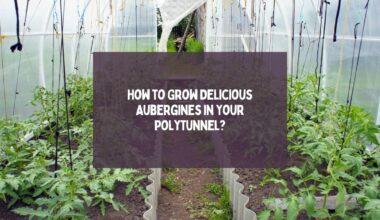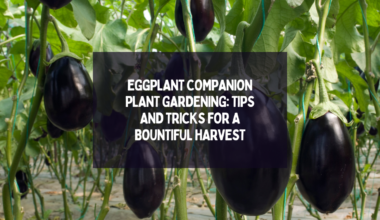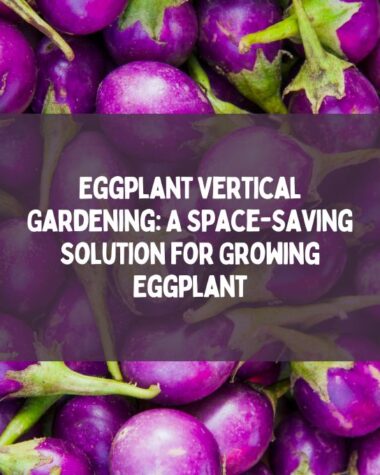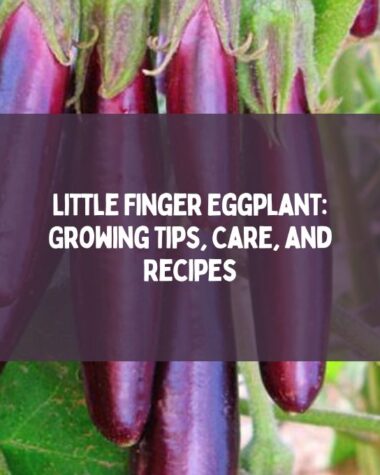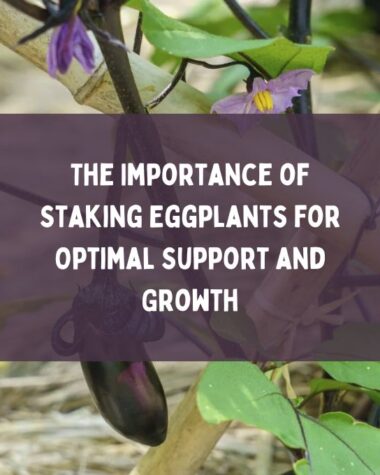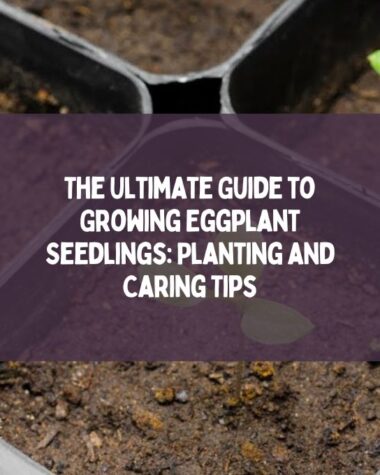Growing aubergines can be a rewarding experience, but as with any other type of gardening, it comes with its own set of challenges. Common aubergine growing problems such as disease, pests, and nutrient deficiencies can put a damper on the success of your aubergine harvest.
In this blog post, I’ll discuss some of the most common aubergine growing problems and provide helpful solutions for ensuring that your aubergines thrive.
What Do You Need To Know About Aubergine Growing Problems?
Growing aubergines (or eggplants) can be a rewarding experience, but it can also be challenging. If you’re having problems growing aubergines, it’s important to know the most common issues you may encounter.
Common Aubergine growing problems include things like diseases, pests, and soil issues.
Some of these problems can cause stunted growth, yellowing of leaves, or even death of your plants. It’s important to stay vigilant and address any eggplant growing problems quickly to ensure a successful harvest.
Understanding what can go wrong and taking steps to prevent or mitigate the damage is key to avoiding aubergine growing problems in the future.
18 Eggplant Growing Problems and Their Solutions
Growing aubergines is a great way to add a tasty and nutritious vegetable to your home garden. Unfortunately, some common problems with eggplant can disrupt the growth process and even lead to crop loss.
The good news is that by understanding what the most common eggplant growing problems are, you can develop effective solutions to keep your plants healthy and thriving.
Let’s take a look at the top 18 eggplant growing problems and their solutions.
Lack of Sunlight
Lack of sunlight is not a disease, but a growing problem that can affect eggplant health and fruit production. Eggplants require full sun for at least 6 hours a day to produce healthy fruit. Lack of sunlight can lead to stunted growth, fewer or smaller fruit, and reduced plant vigor.
Providing the plants with adequate sunlight by planting them in a sunny location or using shade cloth to protect them from excessive heat can help prevent this problem.
Solution
Choose a location for planting that gets at least 6 hours of sunlight per day. You can also use reflective mulch or grow lights to supplement natural light.
Poor Soil Quality
Poor soil quality is a growing problem that can affect eggplant health and fruit production. Eggplants require well-draining soil that is rich in nutrients. Poor soil quality can result in stunted growth, yellow leaves, and poor fruit production.
Solution
Amending the soil with compost, fertilizer, or other organic matter can help improve soil quality and provide the necessary nutrients for the plants to thrive. It is important to test the soil before planting and adjust soil pH and nutrient levels as needed.
Pests & Disease
Pests and diseases are common growing problems that can affect eggplant health and fruit production. Eggplants are susceptible to a range of pests, including aphids, flea beetles, spider mites, and more.
These pests can cause damage to leaves, stems, and fruit, reducing plant vigor and fruit production. Diseases, such as bacterial wilt and fungal infections, can also cause wilting, yellowing, and a decline in plant health.
Solution
Proper pest and disease management practices, such as crop rotation, using organic pesticides, and maintaining good plant hygiene, can help prevent and control these problems.
Overwatering
Overwatering is an eggplant growing problem that can affect plant health and fruit production. Eggplants need soil that drains well and regular watering, but too much water can make the soil soggy, cause root rot, and weaken the plant.
Symptoms of overwatering eggplant include yellowing leaves, stunted growth, and wilting.
Solution
To prevent aubergine overwatering, it is important to allow the soil to dry out between waterings and to avoid watering the plants during rainy periods.
Providing adequate drainage and using mulch can also help prevent overwatering. Water deeply once or twice a week, depending on the weather. Allow the soil to dry out slightly between watering.
Read More:
- Eggplant Vertical Gardening: A Space-Saving Solution for Growing Eggplant
- 10 Tomato Diseases – How to Recognize, Treat, and Prevent?
Underwatering
Underwatering is an aubergine growing problem that can affect eggplant health and fruit production. Eggplants need to be watered often for healthy growth and fruit production. If they don’t get enough water, their leaves will wilt, their growth will be stunted, and they won’t produce many fruits.
Symptoms of underwatering include dry soil and wilted leaves.
Solution
To prevent underwatering, it is important to water the plants regularly, especially during hot and dry periods. It is also important to ensure that the soil is well-draining and that the plants are not overcrowded, which can increase water stress.
Lack of Nutrients
Lack of nutrients is a growing problem that can affect eggplant health and fruit production. Eggplants need nitrogen, phosphorus, potassium, and calcium, among other things, to grow and make healthy fruit. Lack of nutrients can result in yellowing leaves, stunted growth, and poor fruit production.
Solution
Adding organic matter, such as compost or aged manure, to the soil can help improve its fertility and provide the necessary nutrients for plants to thrive. Using a balanced fertilizer can also help give plants the nutrients they need to grow and produce the most fruit.
Temperature Extremes
Temperature extremes are a growing problem that can affect eggplant health and fruit production. Eggplants require warm temperatures (between 70°F and 85°F) to grow and produce fruit, but extreme heat or cold can cause damage to the plants.
High temperatures can cause wilting, sunscald, and reduced fruit production, while low temperatures can cause stunted growth and poor fruit production.
Solution
Choose a location for eggplant planting that is protected from extreme temperatures. Providing shade cloth during hot periods and covering the plants during cold periods can help protect the plants from temperature extremes. It is also important to plant eggplants in a location that receives adequate sunlight and has good air circulation.
Crowding
Crowding is a growing problem that can affect eggplant health and fruit production. Eggplants require adequate space to grow and develop, and crowding can lead to competition for resources and reduced plant vigor.
Symptoms of crowding include stunted growth, yellowing leaves, and poor fruit production.
Solution
Providing adequate spacing between plants, typically 18-36 inches apart, can help prevent crowding and allow for optimal growth and fruit production. It is also important to prune the plants regularly to remove any damaged or diseased growth and to promote healthy growth.
Improper Pruning
If eggplants aren’t pruned right, they won’t produce as many fruits, the fruits will be smaller, and the plants will be more susceptible to pests and diseases. This can happen if the wrong parts of the plant are pruned or if pruning is done at the wrong time.
It is important to understand the proper pruning techniques for eggplants to ensure healthy growth and maximum yield.
Solution
Remove only the lower leaves and suckers to promote airflow and sunlight penetration. Do not prune the main stem.
Improper Planting
If aubergines aren’t planted right, they may not grow as big as they should, make less fruit, and be more susceptible to pests and diseases. This can occur if the eggplants are planted too close together, in unsuitable soil, or in an area that does not receive adequate sunlight or water.
For healthy eggplant growth and a good harvest, it is important to use the right planting methods, such as giving the eggplants enough space and making sure they are planted in the right soil and place.
Solution
Plant eggplants in loose, well-draining soil. Make sure the soil is warm enough for planting, and plant seedlings at the same depth they were in their pots.
Fungal Infections
Fungal infections are a common problem that can affect eggplants and lead to reduced fruit production and quality. Symptoms of fungal infections include spots on the leaves, stem, and fruit, as well as wilting and discoloration.
Fungal infections can be caused by several things, like soil that doesn’t drain well, a lot of humidity, or too many people in a small space. Controlling and preventing fungal infections in eggplants can be done by making sure the plants get enough water, have good ventilation, and get rid of any infected plants.
Solution
Provide proper airflow and avoid overwatering. Use a copper fungicide to control fungal infections.
Inadequate Pollination
Inadequate pollination can result in poor fruit development and yield in eggplants. Eggplants are self-pollinating, but they can benefit from cross-pollination by insects such as bees. Insufficient pollination can happen because there aren’t enough insects, the weather is too hot or cold, or the plants are growing indoors.
You can either grow eggplants outside, where there are lots of insects, or you can manually pollinate them by moving pollen from the stamen to the stigma of the flower with a soft-bristled brush.
Solution
Provide habitat for pollinators like bees and butterflies. You can also hand-pollinate by using a small brush or cotton swab to transfer pollen between flowers.
Weeds
Weeds are a common problem that can compete with eggplants for resources such as nutrients, water, and sunlight, leading to stunted growth and reduced yield. Weeds can also provide a habitat for pests and diseases that can affect the health of eggplants.
Solution
To prevent weed growth, it is important to keep the area around the eggplants clear and to use mulch or other methods to suppress weed growth. Regular weeding and removal of weeds by hand or with tools can also help to control weed growth and maintain healthy eggplant growth.
Related Releading:
Inadequate Support
When eggplants don’t have enough support, problems like broken branches and less fruit can happen. As the plants grow, they can become top-heavy and require support to prevent them from falling over or breaking under the weight of the fruit. Without proper support, the plants can also become tangled and difficult to manage.
Solution
Staking or trellising are common methods for providing support to eggplants and can help to maintain healthy growth and maximize yield. Tie the stems to the support with soft twine or plant ties as the plant grows.
Insufficient Water Drainage
Insufficient water drainage can lead to root rot and other fungal diseases in eggplants. When the soil around the eggplants does not drain properly, it can become waterlogged and create a breeding ground for fungal spores. Symptoms of root rot include stunted growth, yellowing leaves, and wilting.
Solution
To prevent root rot, it is important to ensure that the soil around the eggplants has good drainage and does not become waterlogged. This can be achieved by amending the soil with organic matter and avoiding overwatering.
Sunscald
Sunscald is a common problem that can affect eggplants, especially during the hot summer months. It happens when the fruit is in direct sunlight for a long time, turning it white or yellow and making it feel like leather. Sunscald can also weaken the fruit, making it more susceptible to pests and diseases.
Solution
To prevent sunscald, it is important to provide adequate shade for the eggplants, especially during the hottest part of the day. You can accomplish this by planting the eggplants in a location that receives some shade or by using shade cloth.
Late Planting
When eggplants are planted too late, they can have a lower yield and be more susceptible to pests and diseases. Eggplants require warm soil and air temperatures to grow and produce fruit, and planting them too late in the season can limit their growth and development.
In addition, late-planted eggplants may not have enough time to mature before the first frost or cold weather, which can further reduce their yield.
Solution
To avoid these problems, it is important to plant eggplants early enough in the growing season to allow them enough time to mature before cold weather sets in.
Harvesting Too Late
Harvesting eggplants too late can result in overripe fruits that are bitter, tough, and have seeds that are too large. Overripe eggplants may also become susceptible to pests and diseases, which can affect the overall health of the plant.
Solution
Harvest eggplants when they are shiny and firm. Use a sharp knife or pruning shears to cut the fruit from the plant. To ensure that eggplants are harvested at the right time, it is important to monitor the fruits regularly and pick them when they are firm, shiny, and have a uniform color.
Harvesting the fruits early can also encourage the plant to produce more fruits, resulting in a higher yield.
Related Reading:
Conclusion
Growing aubergines, which are also called eggplant, can be hard because of pests and diseases. However, with the proper knowledge and care, many of these issues can be managed.
If you know how to spot and fix common problems with eggplant, your crops will be healthier and more productive. Identifying potential threats early on and taking steps to prevent them is key to having a successful garden.
Keeping your plants well-watered, fed, and free of diseases will help make sure you have a good harvest.
